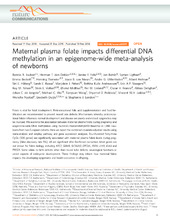Maternal plasma folate impacts differential DNA methylation in an epigenome-wide meta-analysis of newborns
Joubert, Bonnie R; Den Dekker, Herman T; Felix, Janine F; Bohlin, Jon; Ligthart, Symen; Beckett, Emma; Tiemeier, Henning; van Meurs, Joyce B; Uitterlinden, Andre G; Hofman, Albert; Håberg, Siri Eldevik; Reese, Sarah E; Peters, Marjolein J; Kulle Andreassen, Bettina; Steegers, Eric A P; Nilsen, Roy Miodini; Vollset, Stein Emil; Midttun, Øivind; Ueland, Per Magne; Franco, Oscar H; Dehghan, Abbas; De Jongste, Johan C; Wu, Michael C; Wang, Tianyuan; Peddada, Shyamal D; Jaddoe, Vincent W V; Nystad, Wenche; Duijts, Liesbeth; London, Stephanie J
Peer reviewed, Journal article
Published version

View/
Date
2016-02-10Metadata
Show full item recordCollections
Original version
https://doi.org/10.1038/ncomms10577Abstract
Folate is vital for fetal development. Periconceptional folic acid supplementation and food fortification are recommended to prevent neural tube defects. Mechanisms whereby periconceptional folate influences normal development and disease are poorly understood: epigenetics may be involved. We examine the association between maternal plasma folate during pregnancy and epigenome-wide DNA methylation using Illumina’s HumanMethyl450 Beadchip in 1,988 newborns from two European cohorts. Here we report the combined covariate-adjusted results using meta-analysis and employ pathway and gene expression analyses. Four-hundred forty-three CpGs (320 genes) are significantly associated with maternal plasma folate levels during pregnancy (false discovery rate 5%); 48 are significant after Bonferroni correction. Most genes are not known for folate biology, including APC2, GRM8, SLC16A12, OPCML, PRPH, LHX1, KLK4 and PRSS21. Some relate to birth defects other than neural tube defects, neurological functions or varied aspects of embryonic development. These findings may inform how maternal folate impacts the developing epigenome and health outcomes in offspring.
